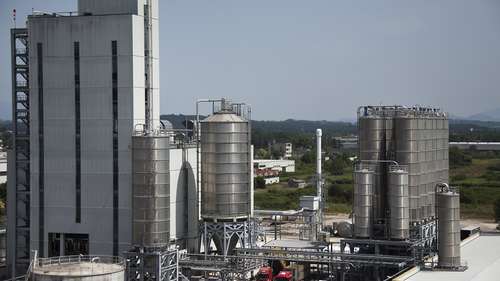
Italian bioplastics company Novamont has opened the world's first industrial plant dedicated to the production of bio-butanediol (BDO). The plant, located in Bottrighe, Italy, has been developed in partnership with California-based engineering firm Genomatica. BDO is a chemical intermediate used in the production of plastics, fibres and polyurethanes, and is currently obtained from fossil sources. The plant will produce 30,000 tonnes of low-impact BDO per year, with CO2 emissions savings of over 50%. The plant is part of Novamont's integrated bio-refinery project, which aims to regenerate local areas and create jobs.
This chemical intermediate, with an estimated market of €3.5 billion, and a vast range of applications, has up till now only been obtained industrially using fossil sources.
Representing an investment of over €100 million, the Mater-Biotech plant in Bottrighe (Rovigo) will be the world’s first industrial plant dedicated to the production of bio-butanediol (BDO). It will produce 30,000 tonnes/year of low-impact BDO, with savings of more than 50% in terms of CO2 emissions, thus helping achieve a “low carbon society”. The plant sees the light of day after conversion of an abandoned factory, thanks to a partnership with Genomatica, an innovative engineering company based in California.
A formidable accelerator for multiplying opportunities in the bioplastics and chemicals fields, for new entrepreneurial initiatives, for the creation of jobs and for a future with greater environmental and social sustainability
Novara sees the official opening of Novamont’s Mater-Biotech plant in Bottrighe (Rovigo), for the production of butanediol on an industrial scale directly from sugars and through the use of bacteria.
A chemical compound derived from butane, butanediol (1,4 BDO) is a chemical intermediate obtained from fossil sources widely used both as a solvent and for the production of plastics, elastic fibres and polyurethanes. Currently with a market of 1.5 million tonnes worth approximately €3.5 billion per year, it is estimated this market will grow to 2.7 million tonnes and more than €6.5 billion by 2020.
Using technology developed by Genomatica, the California-based leader in the field of bioengineering, Novamont has developed a biotechnological platform which takes sugars and transforms them into bio-butanediol through the action of suitably engineered e.coli type bacteria.
The combination of Novamont’s industrial research and know-how and the revolutionary Genomatica technology has given rise to a product which will be produced on an industrial scale: 30,000 tonnes per year when fully operational, with CO2 savings of at least 50%. The environmental sustainability of Novamont’s bio-butanediol is also enhanced by the energy efficiency of the Bottrighe Mater-Biotech plant, which has been designed to reutilise the by-products derived from the process in order to satisfy the plant’s energy requirements, thereby optimising the entire process life cycle.
But, when put into the context of the Novamont integrated bio-refinery project, the scope of this innovation goes beyond the availability of new technologies, bio-based products and the contribution these can make to the need to “decarbonise” planet Earth. As Catia Bastioli, Novamont CEO, puts it: “Mater-Biotech is just one facet of a system of world leader, interconnected plants to be seen as a formidable accelerator, a way of multiplying opportunities in the bioplastics and chemicals fields for the producers of raw materials, for the producers of finished products, for new entrepreneurial initiatives, for the creation of jobs, and for those who are concerned about planning a future with greater environmental and social sustainability”.
With the opening of the Mater-Biotech plant, Novamont now adds a fundamental element to its model for a bioeconomy which it interprets as the regeneration of local areas, taking over abandoned factories or sites in serious difficulty and regenerating them as true and proper “infrastructures of the bioeconomy”.
Today, Novamont has revitalised 6 such sites and has fine-tuned 4 world-leading technologies which can be multiplied in accordance with its model for a bio-refinery integrated with the local area, in which technologies and products are developed to provide concrete solutions to large-scale problems such as the recycling of organic waste.
“Mater-Biotech, together with the Novamont research centres in Piana di Monte Verna and Novara, represents a formidable platform for industrial biotechnologies, from basic research to flagship plants”, concludes Bastioli, “a major opportunity to create competitive edge in partnership with other entities in the academic and industrial sectors”.
When fully operational, the Bottrighe plant will employ around seventy people directly, plus another 180-200 considering also the supply chain.